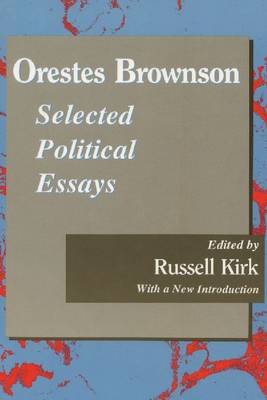Born in Vermont while Thomas Jefferson was president, and dying in Detroit while Rutherford B. Hayes was president, Orestes Brownson knew practicially everybody and wrote about practically everything in the nineteenth century. Called by some a "Marxist before Marx," he travelled from various forms of radicalism and religion to political conservatism and religious orthodoxy. His socialist roots made him a formidable adversary to Marxist thought in his maturity.In his first principles, Brownson came to stand at the opposite pole from Ralph Waldo Emerson; among his friends was John C. Calhoun. He set himself against both Abraham Lincoln and Jefferson Davis, arguing that authority and liberty both are necessary for a commonwealth. Brownson maintained that pure democracy and social equality are death to civilization and liberty; that the moral principles taught by the Church deny the rectitude of leveling egalitarianism; and that those who would preserve the justice and freedom of the American Republic must resist the degradation of the democratic dogma.With force and penetrating intellect, Brownson reminded Americans that they must respect the wisdom of traditional values. By calling for restraints on American materialism and individualism, he did not make himself popular in his time. But as Russell Kirk makes clear in his new introduction, Brownson's ideas ' have had continuing influence, just as his thought has reentered American political discourse. Publication of his essays as part of the Library of Conservative Thought is particularly timely.
- ISBN10 0887388256
- ISBN13 9780887388255
- Publish Date 30 January 1990
- Publish Status Permanently Withdrawn
- Out of Print 28 November 2021
- Publish Country GB
- Publisher Taylor & Francis Inc
- Imprint Transaction Publishers
- Format Paperback
- Pages 235
- Language English
